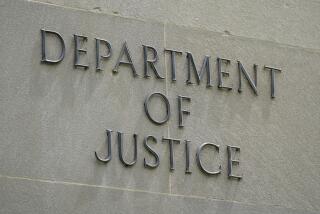IMELDA WATCH : Dick Tracy Doctrine
- Share via
Midway through the trial of Imelda Marcos and Adnan M. Khashoggi, U.S. District Judge John F. Keenan asked what turned out to be the decisive question: “What am I doing here (in a New York City courtroom) trying a case involving the theft of money from Philippine banks?”
In the minds of the jurors who acquitted both defendants on all charges, the answer was clear. “It was on the wrong side of the ocean,” juror Thomas O’Rourke said. “It was a totally silly case. We are not big brothers to the people overseas.”
There is no better common-sense rebuttal to the Bush Administration’s claims for the new reach of American law, an act of self-assertion that the Justice Department calls “extra-territorial jurisdiction.” This novel theory holds that U.S. authorities may seize and try citizens of other nations for acts committed outside the United States. This also is the presumption under which the government seized former Panamanian strongman Manuel A. Noriega. Whatever the wisdom of the U.S. military operation, the application of the extra-territorial doctrine to his case is as legally dubious--and, as it now appears, as risky for prosecutors--as it was in the Marcos debacle.
In both cases, our government is suggesting that it has a sort of custodial, almost parental right to punish the leaders of other countries for their corrupt misrule.
At the very least, it’s a notion that, if pressed, could well exacerbate our court congestion problem.
More to Read
Sign up for Essential California
The most important California stories and recommendations in your inbox every morning.
You may occasionally receive promotional content from the Los Angeles Times.













